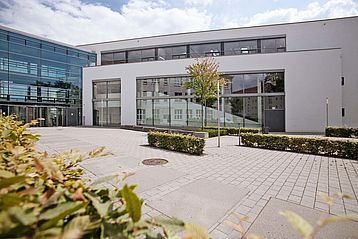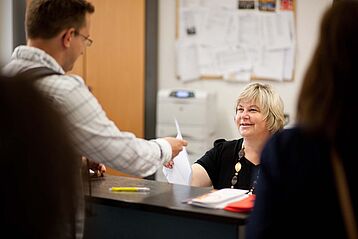![[Translate to Englisch:] [Translate to Englisch:]](/fileadmin/Dokumente/_processed_/8/a/csm_Bildung_und_Erziehung_2c08631732.png)
Bachelor’s in Early Childhood Education
Are you passionate about working with children from early infancy to the end of primary school? Are you interested in helping and supporting children through their formal and non-formal learning processes in after-school care centres, day care facilities and other child and youth welfare services?
The degree program Early Childhood Education provides you with comprehensive theoretical knowledge in areas such as pedagogy, psychology and law, as well as the didactic knowledge and skills to support children in a variety of settings.
You will develop sensitivity, empathy and the ability to reflect on your own professional actions. In addition to the courses offered at the university, you will have regular opportunities to gain your own practical experience. With the Bachelor of Arts (B.A.) degree and state recognition as a Childhood Educator, you will have access to a wide range of occupational fields and can apply to Master's programs at universities of applied sciences and universities once you have graduated.
Studying intertwined with practical experience
Practical training is also part of the degree program. In addition to some modules being accompanied by days of practical work, the supervised blocks of work experience provide a close link between theoretical content, academic research and hands-on training. In the second and fourth semesters, students spend one day a week working in the field. Between the second and third semesters, you will do an orientation work placement of several weeks and in the fifth semester a supervised work placement comprising 512 hours. Finally, the degree program finishes with a work placement in management.
What to expect in your studies
-
- Introduction to Early Childhood Education
- Sociological Basics and Socialization
- Child Development and Early Learning
- Professional Conduct in Early Childhood Education Institutions
-
- Theory and Practice of Play
- Education and Language
- Learning from the world around us
- Musical Education - Elementary Musical Education
- Children with Special Needs
- Educational Guidance for Children
- Culture, Aesthetics and Media
-
- Educational Conduct in Practical Situations
- Professions and Professionalism
- Counselling in the Context of Early Childhood Education
- Professional Identity
-
- Legal Basics
- Organization and Management
- Child and Youth Welfare Services
- Institutions and Transitions
- Diversity and Social Problems
-
- Communications and Core Academic Skills
- Early Childhood Education as a Research Discipline
- Bachelor’s Thesis
-
The practical training consists of work placements, accompanying training sessions and reflection.
Knowledge and skills for future early childhood educators
The degree course in Early Childhood Education comprises seven regular semesters and is divided into six module areas that deal with the basics of child development, educational processes in childhood, professional conduct, social contexts as well as academic work and empirical research. Credits are assigned to the individual modules according to the students' workload. Each module concludes with a module-specific assessment such as a project, written exam, oral exam, term paper or presentation. To successfully complete the degree program, students need to earn 30 credits per semester.
Overview
- Title Bachelor Early Childhood Education
- Qualification/degree Bachelor (Bachelor of Arts)
- Duration 7 semesters
- Mode of study full-time
-
Flexibility
Open for occasional students
Part-time studies possible
Open to affiliate students
-
Beginning
Winter semester
- Costs -
- Admission Restricted admissions (NC)
- Period for application 15.05. - 15.07.
- General Requirements Yes Show
- Special Requirements Yes Show
- International application Show
Structure of the Bachelor’s Program in Early Childhood Education
The degree course in Early Childhood Education begins every winter semester. It comprises seven regular semesters and leads to the Bachelor's degree in Early Childhood Education as well as to state recognition as a Childhood Educator. A pre-study placement of at least eight weeks is required for the degree program.
Assessments
In the module catalogue, there is a module description for every module. All the information on course contents, learning objectives and assessments is published here. In addition, you will find information on the time allocated for classroom teaching, self-study and exam preparation.
For each module, the assessment is specified in the respective module description; the Academic Regulations and Procedures for Bachelor's and Master's Degrees at the University of Applied Sciences Erfurt and the program regulations (study regulations) provide the binding framework in this regard.
Cross-curricular competences
During your Bachelor's degree, you will have to take elective modules worth at least 6 ECTS credits.
These can be modules from your own department or courses offered by other departments, the Language Centre, PACKS or the Start-Up Service.
Courses at other universities or external providers that have a cooperation agreement with the university (e.g. Netzwerk Courage) can also be accessed.
Important documents
- Academic Regulations
- Module Catalogue Enrolments from WS 18/19
- Module Catalogue Enrolments from SS 12
Your Background
Find out here what you need to consider when applying for the Bachelor's degree program in Early Childhood Education!
Please note: This degree program is taught in German and therefore requires all students to have at least C1 level German skills. More information on applying to FH Erfurt as an international student can be found here.
Entry requirements
-
In order to study Early Childhood Education, students must hold a general or specialist qualification for entry to universities or universities of applied sciences (Fachhochschulreife). You can find information on the general study requirements here.
-
Another admission requirement for the degree program in Early Childhood Education is an 8-week pre-study placement working full-time (40 hours per week) in an areae related to early childhood education. This placement should be carried out under the supervision of qualified education professionals in day-care centres for children aged 0-6, in primary schools or after-school care centres. The work placement can be divided into two parts (at least 4 weeks in one institution).
Recognizing work placements - you will find an overview here
Extended selection procedure
There is an extended selection procedure for the degree program Early Childhood Education as per the corresponding regulations. You score points for the average grade of your university entrance qualification, the admissions test and your experience and skills.
-
The average grade of your university entrance qualification is the most important factor in the selection procedure. A maximum of 100 points can be achieved in the selection procedure. The average grade of your university entrance qualification has a total weighting of 60%, i.e. up to 60 points, in the selection decision.
Conversion of entrance qualification grade into points:
Grade = Points
1.0 - 60
1.1 - 58
1.2 - 56
1.3 - 54
1.4 - 52
1.5 - 50
1.6 - 48
1.7 - 46
1.8 - 44
1.9 - 42
2.0 - 40
2.1 - 38
2.2 - 36
2.3 - 34
2.4 - 32
2.5 - 30
2.6 - 28
2.7 - 26
2.8 - 24
2.9 - 22
3.0 - 20
3.1 - 18
3.2 - 16
3.3 - 14
3.4 - 12
3.5 - 10
3.6 - 8
3.7 - 6
3.8 - 4
3.9 - 2
from 4.0 - 0 -
An admissions test accounts for up to 20% (maximum 20 points) in the selection decision. The admissions test takes the form of an exposé, which should be at least 2 and no more than 3 pages of A4 and contain the following information:
- your personal reasons for choosing this degree course
- your own ideas about your future career prospects
- statement of your personal suitability to study this subject
Please also attach a curriculum vitae to the exposé.
Additional points
You can earn further points for vocational training that is specific to your degree program, for relevant work related to your field of study, and for additional specialist qualifications.
-
Vocational training specific to the degree program counts for up to 10% (maximum of 10 points) in the decision. Only your highest educational qualification is taken into account.
- Social Assistant or Child Care Worker = up to 5 points
- Curative Education Therapist = up to 7 points
- Pre-School Teacher = up to 10 points
-
Any relevant work related to the professional field in addition to the pre-study placement will count for up to 5 % (maximum 5 points) in the selection decision. The maximum number of points is awarded if there is proof of at least 18 months of full-time practical work in an educational institution for children up to the end of primary school. Practical placements during vocational training are not taken into account.
-
Additional specialist qualifications, accomplishments and experience, especially in the fields of social work, education, the arts, therapy or sport, which may indicate a particular aptitude for the degree program, count for up to 5% (maximum 5 points) in the selection decision. Only the highest additional qualification is considered
Starting your career with a Bachelor’s in Early Childhood Education
A Bachelor's degree in Early Childhood Education qualifies you to work with children of pre-school and primary school age. You will work directly with children, advise parents and families on educational issues, conduct research on development, upbringing and education, draw up concepts or later take on management responsibilities in educational institutions. Potential occupational fields include:
- day care facilities for children
- multi-generational work
- parent and child facilities or family support centres
- pre-schools, all-day schools or after-school clubs
- early intervention centres
- child and youth welfare facilities
- holiday recreation and leisure pedagogy
You can also stay in our faculty to pursue a Master's degree in "Counselling and Intervention" or "International Social Work".
On our online job market, students can find study-related work, host organizations in Germany and abroad, Bachelor's and Master's thesis topics, as well as graduate positions.
Alumni network
Stay in touch with us after graduation by registering with our alumni network.






